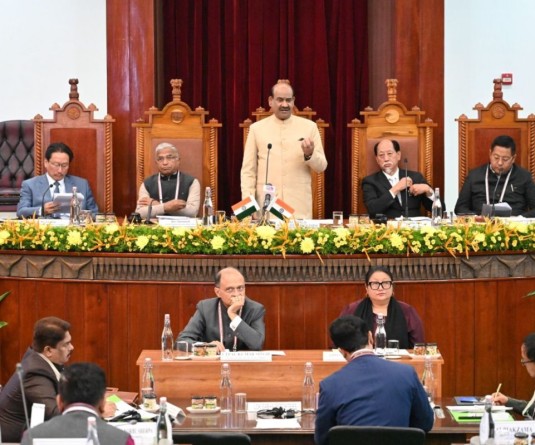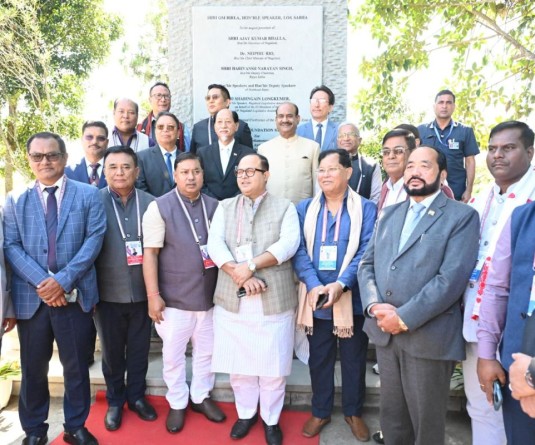
Dimapur, July 16 (MExN): A five-days training on value chains using an approach developed by the Deutsche Gesellschaft für Internationale Zusammenarbeit (GIZ) GmbH was held from July 9 to 13 in partnership with the Office of the Agriculture Production Commissioner (APC), Government of Nagaland.
Peter Gross, Project Director, Climate Change Adaptation-North Eastern Region (CCA-NER) in a press release stated that the training was organised under the Indo-German project‚ ‘Climate Change Adaptation-North Eastern Region (CCA-NER)’ in collaboration with the Ministry of Development of North Eastern Region (MDoNER). The training participants included government officials, research scholars and various organisations from states of Mizoram, Meghalaya, Sikkim and Nagaland.
The training introduced the participants to the approach of Value Links and was moderated by Alfons Eiligmann, IDC Unternehmensberatung GmbH, Lead trainer and Secretary of the International ValueLinks Association, Germany and Dr. Rajeev Sharma, member of the International ValueLinks Association, India.
The purpose of the training was to enhance the capacity of the field officers on areas of agriculture value chain; improve analytical skills on value chain production, market opportunities, challenges and risks and strengthen the capacity of field functionaries, to develop comprehensive business plan.
Ministry of Development of North-Eastern Region was represented by Mercy Epao, Director, MDoNER along with Temsunaro Aier, Additional Secretary, Agriculture, Government of Nagaland. Both of them voiced out that the training has a high relevance in areas of promoting farm produces from the North-East region. Temsunaro Aier also stressed the need of organising such training for the policy makers which will better equip them in making comprehensive agriculture policies. Bendangyanger, CEO, Nagaland State Agriculture Marketing Board also attended the inaugural session.
ValueLinks is a brand name for an approach designed by the Deutsche GIZ GmbH and used worldwide to assist practitioners in improving their understanding and skills to develop meaningful value chains for various produces. Set examples from across the world was used and working groups sessions helped the participants to get a firsthand experience to develop value chains.
About Deutsche GIZ GmbH
The Deutsche Gesellschaft für Internationale Zusammenarbeit (GIZ) GmbH is Germany's leading provider of international cooperation services.
As a federal enterprise, GIZ support the German Government in achieving its objectives in the field of international cooperation for sustainable development. With a global footprint in over 120 countries, GIZ leverages its regional and technical expertise for local innovation. For over 60 years, GIZ has been working jointly with partners in India for sustainable economic, ecological, and social development. Currently, GIZ has over 330 employees in India, of whom 85 per cent are national personnel. India is fast emerging as an economic and industrial power.
It is a member of the ‘Group of Twenty’ (G20) as well as one of the five major emerging national economies, namely Brazil, Russia, India, China and South Africa (BRICS). Despite the country’s rapidly growing economy, poverty and other socio-economic issues remain a challenge. The burgeoning population and accelerated urbanisation in the country have resulted in an environment at risk and greenhouse gas emissions that continue to spiral upwards. The focal areas of Indo-German cooperation currently are a) Energy, b) Environment, Preservation, and Sustainable Use of Natural Resources, c) Sustainable Urban and Industrial Development and d) Sustainable Economic Development. The Federal Ministry for Economic Cooperation and Development (BMZ), the Federal Ministry for Environment, Nature Conservation and Nuclear Safety (BMU) as well as the Federal Ministry for Economic Affairs and Energy (BMWi) are the main commissioning parties of GIZ in India.
Other clients include Indian public sector clients, the European Union and foundations. The Government of India has launched numerous important initiatives to address the country’s economic, environmental and social challenges, and GIZ is contributing to some of the most significant ones. For example, it supports key initiatives such as Smart Cities, Clean India and Skill India. GIZ, in close cooperation with Indian partners, devises tailor-made, jointly-developed solutions to meet local needs and achieve sustainable and inclusive development.






